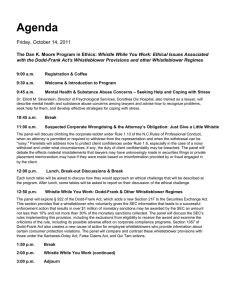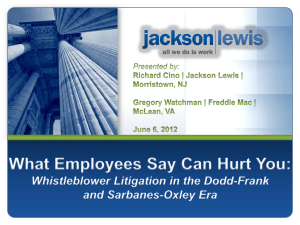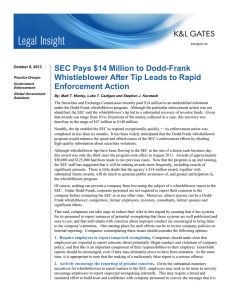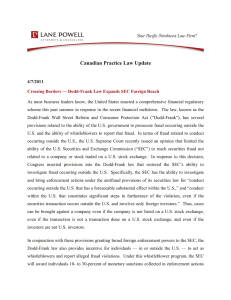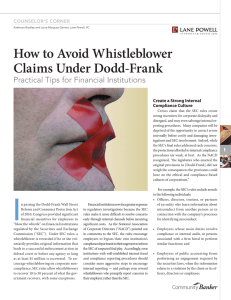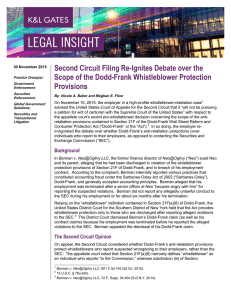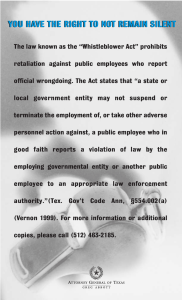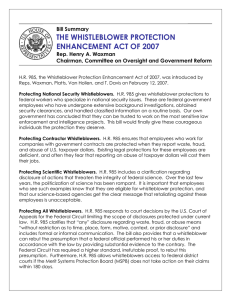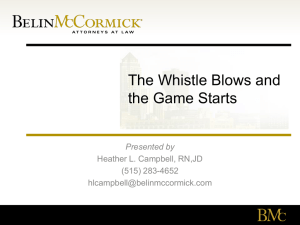Second Circuit Holds That Whistleblowers Who Report Alleged
advertisement
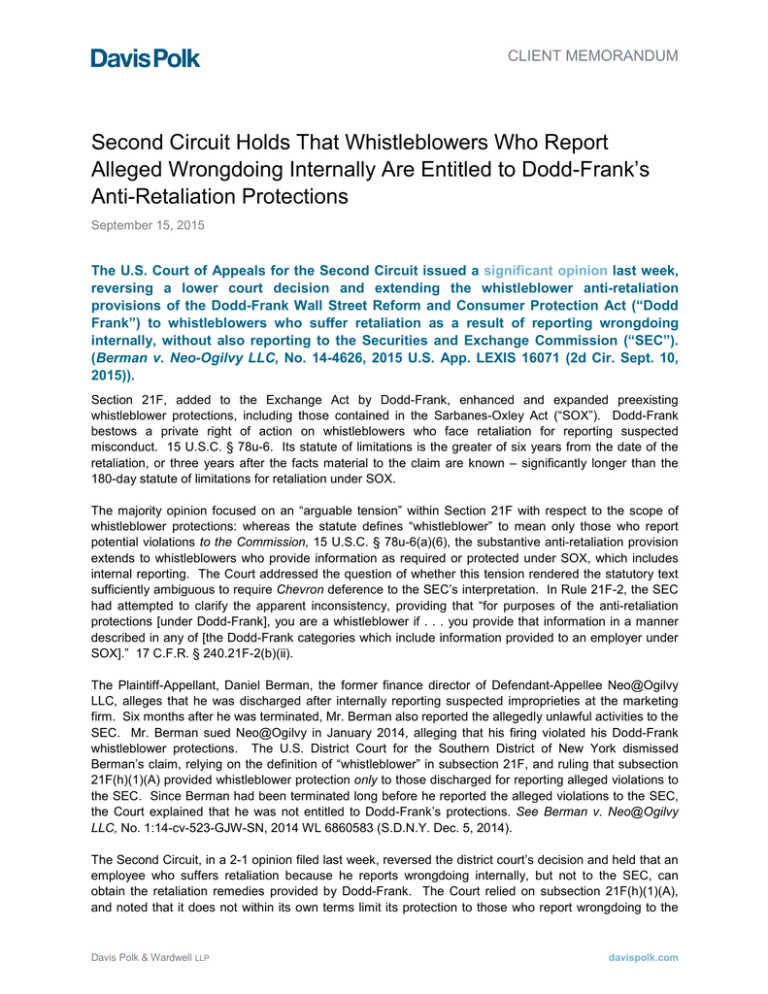
CLIENT MEMORANDUM Second Circuit Holds That Whistleblowers Who Report Alleged Wrongdoing Internally Are Entitled to Dodd-Frank’s Anti-Retaliation Protections September 15, 2015 The U.S. Court of Appeals for the Second Circuit issued a significant opinion last week, reversing a lower court decision and extending the whistleblower anti-retaliation provisions of the Dodd-Frank Wall Street Reform and Consumer Protection Act (“Dodd Frank”) to whistleblowers who suffer retaliation as a result of reporting wrongdoing internally, without also reporting to the Securities and Exchange Commission (“SEC”). (Berman v. Neo-Ogilvy LLC, No. 14-4626, 2015 U.S. App. LEXIS 16071 (2d Cir. Sept. 10, 2015)). Section 21F, added to the Exchange Act by Dodd-Frank, enhanced and expanded preexisting whistleblower protections, including those contained in the Sarbanes-Oxley Act (“SOX”). Dodd-Frank bestows a private right of action on whistleblowers who face retaliation for reporting suspected misconduct. 15 U.S.C. § 78u-6. Its statute of limitations is the greater of six years from the date of the retaliation, or three years after the facts material to the claim are known – significantly longer than the 180-day statute of limitations for retaliation under SOX. The majority opinion focused on an “arguable tension” within Section 21F with respect to the scope of whistleblower protections: whereas the statute defines “whistleblower” to mean only those who report potential violations to the Commission, 15 U.S.C. § 78u-6(a)(6), the substantive anti-retaliation provision extends to whistleblowers who provide information as required or protected under SOX, which includes internal reporting. The Court addressed the question of whether this tension rendered the statutory text sufficiently ambiguous to require Chevron deference to the SEC’s interpretation. In Rule 21F-2, the SEC had attempted to clarify the apparent inconsistency, providing that “for purposes of the anti-retaliation protections [under Dodd-Frank], you are a whistleblower if . . . you provide that information in a manner described in any of [the Dodd-Frank categories which include information provided to an employer under SOX].” 17 C.F.R. § 240.21F-2(b)(ii). The Plaintiff-Appellant, Daniel Berman, the former finance director of Defendant-Appellee Neo@Ogilvy LLC, alleges that he was discharged after internally reporting suspected improprieties at the marketing firm. Six months after he was terminated, Mr. Berman also reported the allegedly unlawful activities to the SEC. Mr. Berman sued Neo@Ogilvy in January 2014, alleging that his firing violated his Dodd-Frank whistleblower protections. The U.S. District Court for the Southern District of New York dismissed Berman’s claim, relying on the definition of “whistleblower” in subsection 21F, and ruling that subsection 21F(h)(1)(A) provided whistleblower protection only to those discharged for reporting alleged violations to the SEC. Since Berman had been terminated long before he reported the alleged violations to the SEC, the Court explained that he was not entitled to Dodd-Frank’s protections. See Berman v. Neo@Ogilvy LLC, No. 1:14-cv-523-GJW-SN, 2014 WL 6860583 (S.D.N.Y. Dec. 5, 2014). The Second Circuit, in a 2-1 opinion filed last week, reversed the district court’s decision and held that an employee who suffers retaliation because he reports wrongdoing internally, but not to the SEC, can obtain the retaliation remedies provided by Dodd-Frank. The Court relied on subsection 21F(h)(1)(A), and noted that it does not within its own terms limit its protection to those who report wrongdoing to the Davis Polk & Wardwell LLP davispolk.com SEC, but rather “expands the protections of Dodd-Frank to include the whistleblower protection provisions of Sarbanes-Oxley, and those provisions, which contemplate an employee reporting violations internally, do not require reporting violations to the Commission.” The Second Circuit explained that this subsection was in tension with Dodd-Frank’s definition of “whistleblower.” It therefore found section 21F of DoddFrank as a whole sufficiently ambiguous to warrant the Court’s deference to the reasonable interpretation of the SEC, which made clear in its rulemaking that the anti-retaliation protections of Dodd-Frank are broad enough to cover whistleblowing other than directly to the Commission. The Second Circuit’s decision creates a circuit split with the Fifth Circuit, which has held that the subsection 21F definition of “whistleblower” “expressly and unambiguously requires that an individual provide information to the SEC to qualify as a ‘whistleblower’ for purposes of § 78u-6.” Asadi v. G.E. th Energy (USA), LLC, 720 F.3d 620, 623 (5 Cir. 2013). In a dissenting opinion, Judge Jacobs cited extensively to Asadi, writing that the statutory text is unambiguous and excludes whistleblower protections to all except those who reported to the SEC prior to being terminated. If you have any questions regarding the matters covered in this publication, please contact any of the lawyers listed below or your regular Davis Polk contact. Angela T. Burgess 212 450 4885 angela.burgess@davispolk.com Michael S. Flynn 212 450 4766 michael.flynn@davispolk.com Antonio J. Perez-Marques 212 450 4559 antonio.perez@davispolk.com Neal A. Potischman 650 752 2021 neal.potischman@davispolk.com Linda Chatman Thomsen 202 962 7125 linda.thomsen@davispolk.com Raul F. Yanes 202 962 7122 raul.yanes@davispolk.com Sidney J. Bashago 212 450 4826 sidney.bashago@davispolk.com © 2015 Davis Polk & Wardwell LLP | 450 Lexington Avenue | New York, NY 10017 This communication, which we believe may be of interest to our clients and friends of the firm, is for general information only. It is not a full analysis of the matters presented and should not be relied upon as legal advice. This may be considered attorney advertising in some jurisdictions. Please refer to the firm's privacy policy for further details. Davis Polk & Wardwell LLP 2
